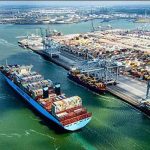In May 2024, Deltamarin finished a three-year EU-funded project called CHEK. Project CHEK involved 15 consortium partners and focused on decarbonizing long-distance shipping.
Decarbonisation was approached from several fronts: Two conceptual vessel designs—a bulk carrier and a cruise ship—were developed, equipped with an interdisciplinary and innovative technology combination to reduce greenhouse gas emissions by 99% and achieve 50% energy savings. Framework conditions that influence long-distance shipping were also analyzed, and the impact of the “CHEK technologies” was projected onto the global fleet.
Deltamarin played a central role in the project by orchestrating the decarbonization methods for the conceptual vessel designs. The development focused on a future-proof vessel (FPV) design platform, which allows holistic evaluation of ship energy and environmental efficiency as early as the ship conceptual design stage.
The FPV design platform consists of several digital layers, such as the ship volume and structural layer (DeltaWay), the ship operational propulsion power layer (DeltaSeas), and the ship system-level energy model (Deltakey). The various layers have strong connections to each other, but independent analysis can be performed, which is typically necessary for practical project work.
The digital design layers are input to the latest dimension in Deltamarin’s toolbox: life cycle assessment (LCA). The numerous design variations studied during ship conceptual design can now also be analyzed regarding their impact on the ship’s lifetime, considering the upstream energy and material flows and end-of-life stage.
The project goals were met, and the technologies were tested either in-lab or under real conditions, in addition to digital modeling. For instance, two sails were installed onboard a Kamsarmax-sized bulk carrier. Project CHEK was also recognised by the European Commission for contributing to a more sustainable maritime industry and listed as a Research and Innovation Project success story.
“Shipping decarbonization will fundamentally change ship energy systems and requires both the symbiosis of technical solutions for ships and strong cooperation between various stakeholders. We have enjoyed fantastic teamwork in our “CHEK family.” We have shared data, models, and expertise; this kind of trusting environment is the most important innovation platform. It has been my honor and pleasure to work in CHEK!” concludes Mia Elg. R&D Manager at Deltamarin.
Source: Deltamarin





